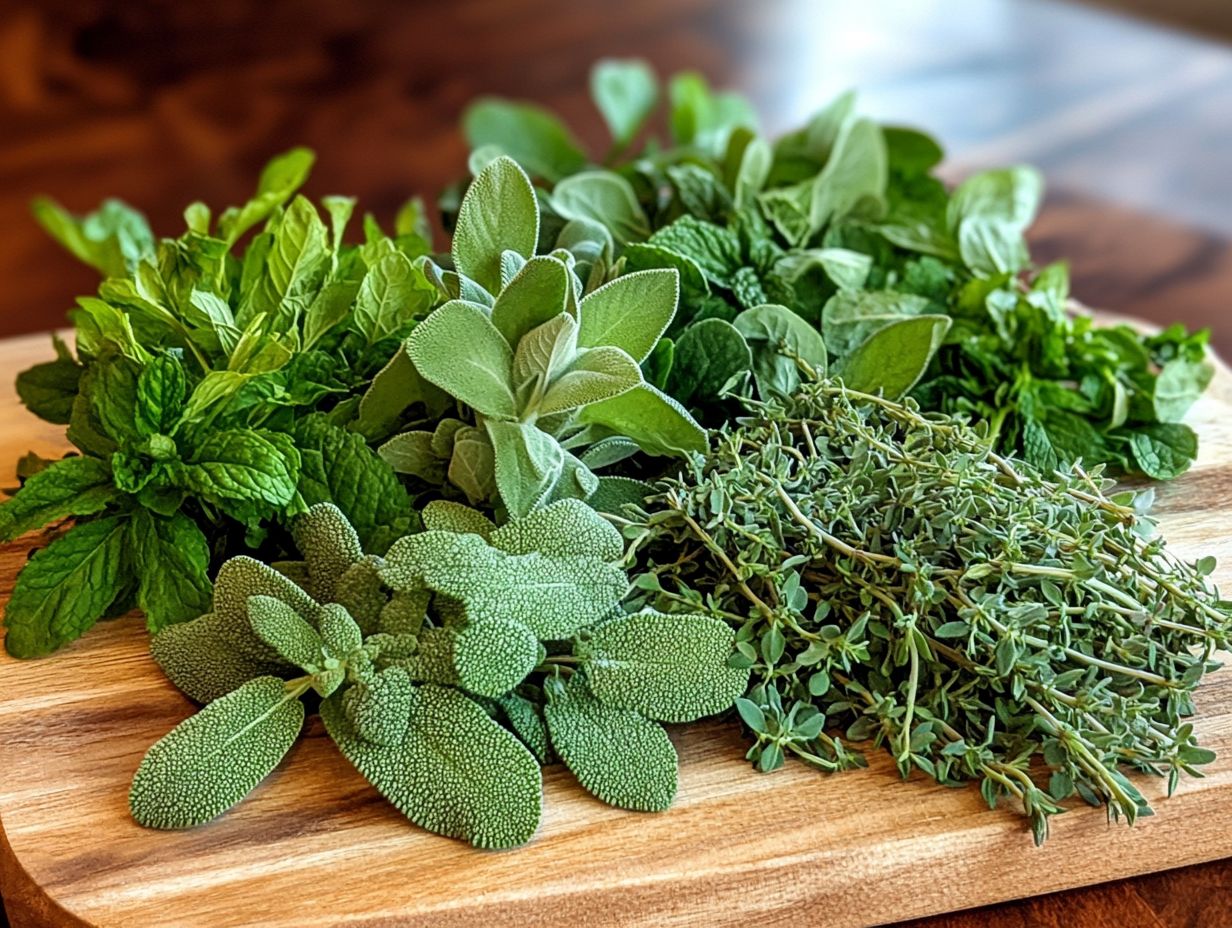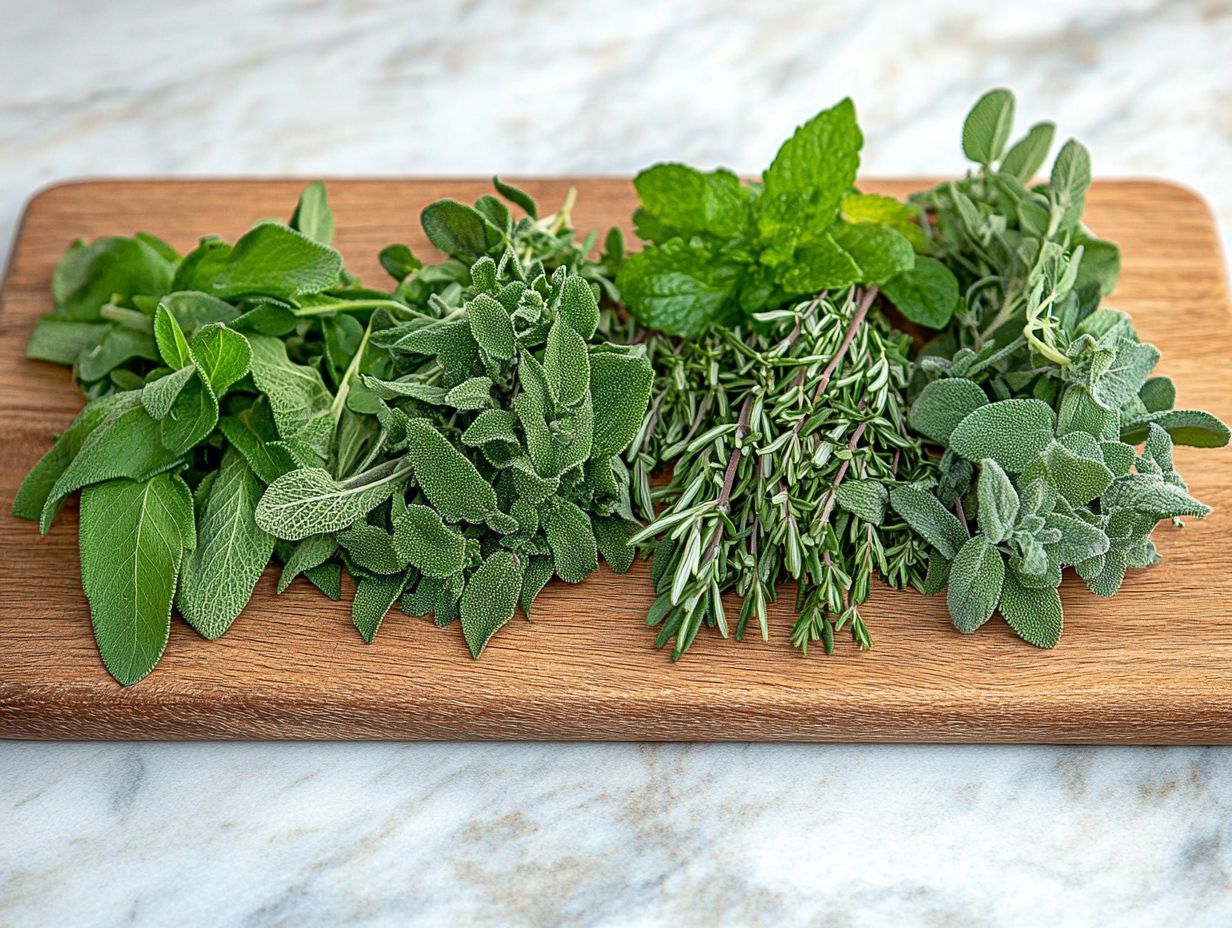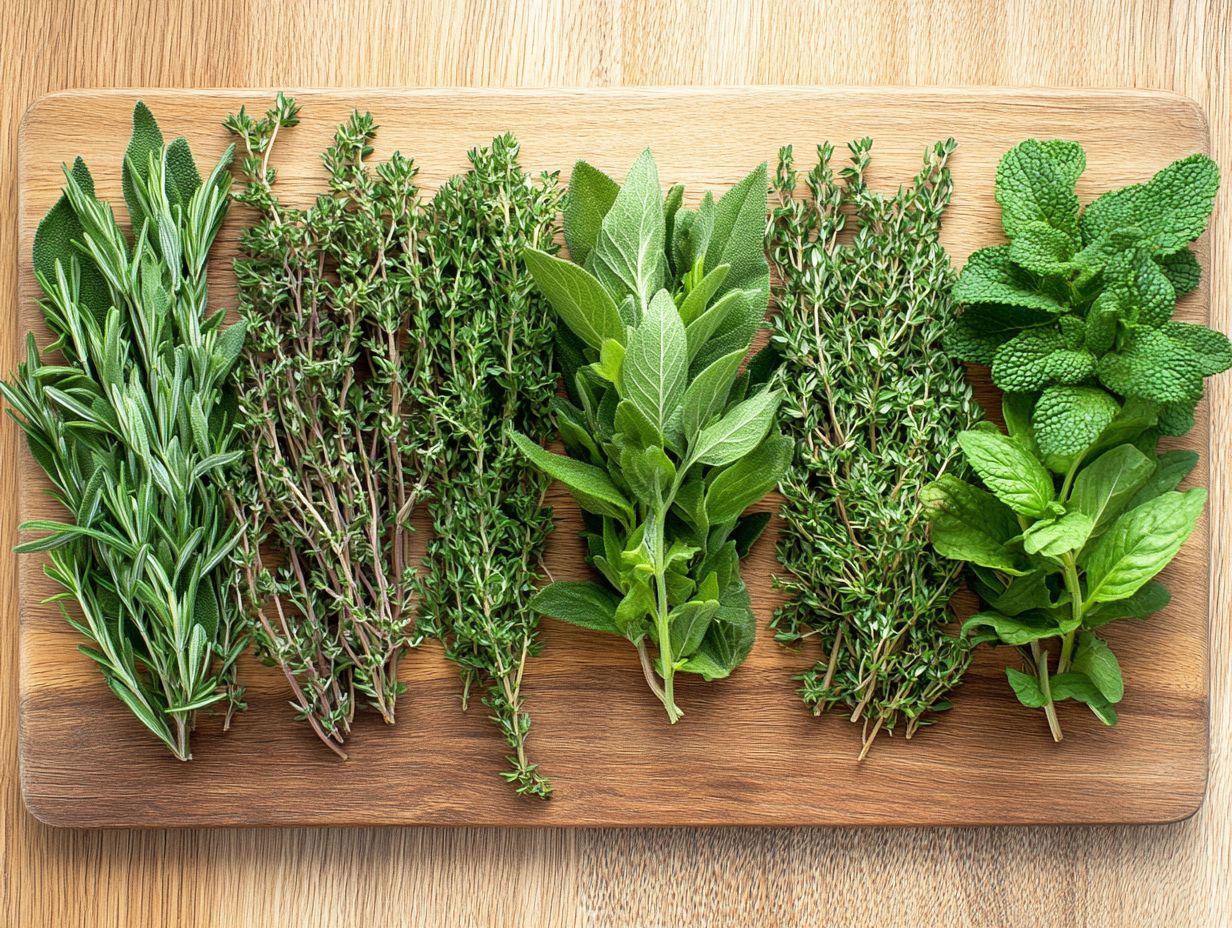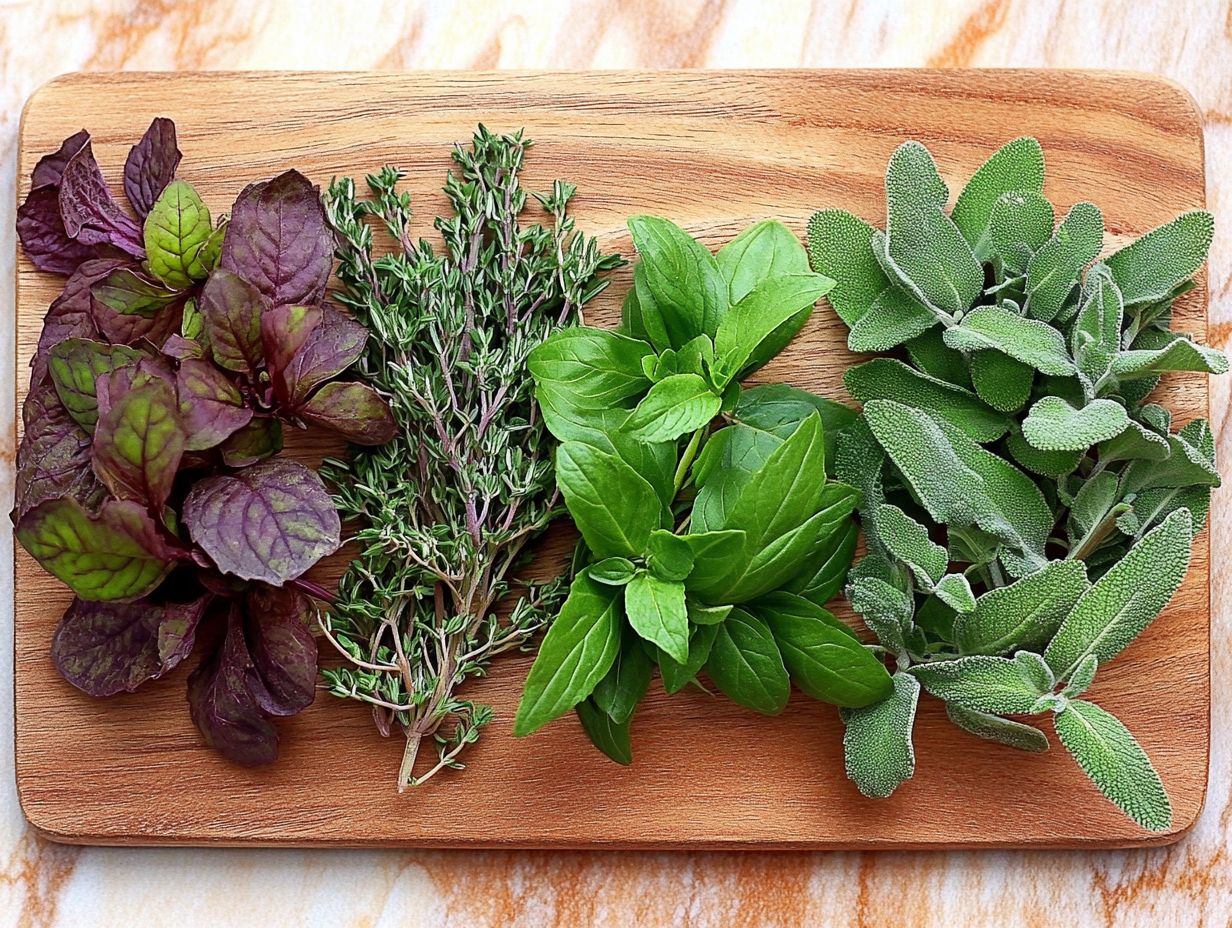5 Best Herbs for Respiratory Health
Are you on the hunt for natural methods to support your respiratory health? This article delves into five remarkable herbs Eucalyptus, Ginger, Peppermint, Licorice Root, and Thyme that can help clear your airways and promote better breathing.
You’ll find insights on common respiratory health challenges and how these herbs can work wonders for you. Plus, there are practical tips for seamlessly incorporating them into your daily routine.
It also addresses potential side effects and shines a light on the additional benefits these herbs can provide. Discover how you can breathe easier and elevate your overall well-being!
Contents
- Key Takeaways:
- 1. Eucalyptus
- 2. Ginger
- 3. Peppermint
- 4. Licorice Root
- 5. Thyme
- What Are Respiratory Health Problems and How Do They Affect the Body?
- How Can Herbs Help with Respiratory Health?
- Frequently Asked Questions
- What are the 5 best herbs for respiratory health?
- How do I choose the right herb?
- When is the best time to take these herbs?
- How does thyme benefit respiratory health?
- What are the benefits of using eucalyptus for respiratory health?
- How does peppermint help with respiratory health?
- What makes oregano a good herb for respiratory health?
- How can ginger improve respiratory health?
Key Takeaways:

Eucalyptus, ginger, peppermint, licorice root, and thyme are the top 5 herbs for respiratory health.
These herbs can help with various respiratory health problems.
They offer additional benefits such as reducing inflammation and boosting immunity.
You can use these herbs in different forms such as teas, steam inhalation, or essential oils.
However, it is important to consult a healthcare professional before incorporating them into your daily routine.
1. Eucalyptus
Eucalyptus stands as a powerful herbal remedy, celebrated for its ability to support respiratory health. It is often featured in cough syrups and essential oils designed to alleviate breathing difficulties.
This versatile plant acts as an expectorant, which means it helps clear mucus from the airways. This makes it especially beneficial during respiratory infections.
Many find relief by inhaling eucalyptus essential oil, which opens the pathways in the lungs. Brewing eucalyptus tea can also provide a soothing experience.
The active compounds within eucalyptus promote increased mucus clearance, offering a natural defense against pathogens.
This synergy enhances your body s ability to combat colds and flu. With options ranging from soothing chest rubs to herbal infusions, eucalyptus presents multiple avenues for respiratory wellness.
2. Ginger
Ginger is a remarkably versatile herbal remedy, known for its ability to strengthen your immune system. It is often used in various natural remedies and herbal formulations.
This time-honored remedy features powerful anti-inflammatory and antimicrobial properties that ease symptoms of respiratory infections.
When consumed, ginger may reduce airway inflammation, soothing throat irritation and clearing congestion.
One delightful way to enjoy ginger is through ginger tea. When enhanced with honey and lemon, it elevates flavor and adds extra antimicrobial benefits.
This harmonious blend creates a synergistic effect, fortifying your body s defenses against illness. Incorporating ginger into your daily routine through teas, soups, or stir-fries allows you to harness its healing potential.
3. Peppermint
Peppermint is more than just a delightful flavor; it s a powerful herbal ally for respiratory health. It can ease bronchospastic symptoms and boost lung function.
The active compound menthol in peppermint effectively opens airways, making it easier to breathe during respiratory infections.
You can incorporate peppermint into your daily routine in several enjoyable ways:
- Sipping on a warm cup of peppermint tea for a soothing experience.
- Taking capsules for a concentrated dose.
- Using peppermint essential oil, either by inhaling or diffusing it, can help clear nasal passages.
These methods tap into the herb’s natural potency and promote a holistic approach to maintaining respiratory well-being.
Experience relief with these natural wonders! Try incorporating one herb at a time into your routine and see the difference it makes.
4. Licorice Root

Licorice root is a time-honored herbal remedy, known for its calming impact on the respiratory system. It appears in cough syrups and herbal teas, effectively alleviating symptoms of respiratory infections while boosting overall wellness.
This extraordinary herb acts as an expectorant, helping you cough up mucus and breathe easier. It’s an essential ally during cold and flu season.
Herbalists blend licorice root with other beneficial herbs like thyme and mullein, mixing powerful combinations for fast relief. This thoughtful approach soothes sore throats and clears airways.
The combination of these ingredients not only provides relief from discomfort but also supports immune health, showcasing the potential of herbal remedies in nurturing respiratory vitality.
5. Thyme
Thyme is an impressive herb known for its powerful antimicrobial properties and ability to enhance respiratory health. You ll often find it in herbal teas and remedies aimed at combating respiratory infections and improving lung function.
Thanks to its rich compounds like thymol and carvacrol, thyme serves as a natural expectorant, effectively clearing mucus from your airways and soothing pesky coughs. When paired with herbs like sage or eucalyptus, its therapeutic effects get even stronger.
Incorporating thyme into your daily routine is simple. Whether you enjoy soothing infusions or concentrated tinctures, these preparations offer an easy way to benefit from thyme while promoting your overall wellness.
What Are Respiratory Health Problems and How Do They Affect the Body?
Respiratory health problems include various conditions that can significantly impact your well-being. They can lead to breathing difficulties, reduced lung function, and increased vulnerability to infections that compromise your immune system.
Common respiratory issues include asthma, bronchitis, and pneumonia. Asthma poses challenges in daily life, especially during physical exertion or exposure to allergens, ultimately affecting your quality of life.
Chronic bronchitis can lead to a persistent cough and discomfort, making social interactions tougher. Pneumonia, a more serious condition, can severely weaken your body, sometimes requiring hospitalization and an extended recovery period.
Prioritizing respiratory health through vaccination, avoiding smoking, and engaging in regular exercise is essential. By taking these preventive measures, you can enjoy a more active and fulfilling life.
How Can Herbs Help with Respiratory Health?
Herbs are vital in enhancing respiratory health, and knowing the 5 must-have herbs for herbalists can offer natural remedies that strengthen your immune system, reduce inflammation, and alleviate various breathing difficulties.
Echinacea is remarkable for its ability to boost immune response. Thyme and oregano are celebrated for their antimicrobial properties, helping you combat respiratory infections effectively.
Peppermint is often recommended for its menthol content, which opens your airways and eases congestion.
Today, these herbs easily fit into teas, essential oils, and capsules, giving you accessible options for relief from ailments like asthma and bronchitis.
The benefits of these herbal remedies support lung function and promote overall respiratory well-being, combining ancient wisdom with modern health solutions tailored for you.
What Are the Different Ways to Use These Herbs for Respiratory Health?

You have many options for using herbs to support your respiratory health. These include herbal supplements, cough syrups, and soothing herbal teas that offer immediate relief and promote overall well-being, as highlighted in 5 popular herbs and their health benefits.
Teas and tinctures are great options for you. Tinctures are concentrated herbal extracts that you can take easily, either mixed with water or directly. Capsules are another convenient choice, allowing you to manage precise dosages and incorporate them into your daily routine. If you re interested in topical applications, herbal salves and essential oils can be applied directly to your chest or used in steam inhalation to help open your airways.
Each method has unique benefits:
- Teas hydrate the body.
- Tinctures pack a powerful punch.
- Capsules offer convenience.
By weaving these approaches into your daily habits, you can easily boost your respiratory health!
Are There Any Side Effects of Using These Herbs?
While herbal remedies are generally safe, it s crucial to be aware of potential side effects from using certain herbs for respiratory health. This is especially true when consumed in excess or combined with other medications.
Herbs like eucalyptus and thyme, while popular, can interact with prescription medications or worsen existing health issues. This highlights the need to approach their use with caution.
If you have conditions like asthma or hypertension, or if you re pregnant, it s especially important to be vigilant, as some herbs may not be suitable for you.
It s wise to talk to a healthcare provider first. This will help you develop a personalized approach that considers both the benefits and potential risks, making your journey toward respiratory wellness safe and effective.
What Are the Other Benefits of These Herbs?
Beyond supporting respiratory health, these herbs offer numerous benefits, enhancing your wellness journey by boosting immunity and providing comprehensive health support.
Their powerful anti-inflammatory properties can alleviate chronic pain and reduce inflammation throughout your body. Many people find these herbs to be natural stress relievers, discovering their soothing effects promote mental clarity and emotional balance.
This holistic approach nurtures your physical well-being and cultivates a sense of peace and tranquility, crucial for overall wellness. By adding these herbs to your daily life, you may notice improvements in both your mental and emotional health, aligning perfectly with maintaining vitality and harmony.
How Can One Incorporate These Herbs into Their Daily Routine?
Adding herbs to your daily life is a simple yet powerful way to enhance your respiratory health and overall wellness. With herbal remedies, supplements, and teas blending into your routine, you can effortlessly boost your well-being.
By thoughtfully choosing a variety of fresh or dried herbs, you can transform your meals, snacks, and beverages with minimal effort. For example, craft a refreshing basil lemonade by steeping fresh basil leaves in hot water, then mixing in lemon juice and honey for a delightful drink.
Adding chopped parsley or cilantro to your salads boosts flavor and enhances nutritional value. Consider simple recipes like herbal syrups made from thyme or ginger, which can be drizzled over pancakes or yogurt, offering both taste and therapeutic benefits.
To truly maximize these health advantages, setting a weekly plan for integrating these herbs into your meals can make the practice enjoyable and effective, turning wellness into an accessible part of your life.
Frequently Asked Questions

What are the 5 best herbs for respiratory health?
The 5 best herbs for respiratory health are thyme, eucalyptus, peppermint, oregano, and ginger.
How do I choose the right herb?
Consider your specific health needs and preferences. Research each herb’s benefits and consult a healthcare provider for personalized guidance.
When is the best time to take these herbs?
Many herbs can be taken at any time, but some may be more effective when consumed regularly or at specific times of the day. Always follow guidance from a healthcare professional.
How does thyme benefit respiratory health?
Thyme contains compounds that loosen mucus and reduce coughing. This makes it a great option for treating respiratory infections and bronchitis.
What are the benefits of using eucalyptus for respiratory health?
Eucalyptus is anti-inflammatory and acts as a decongestant. It’s useful for easing sinus infections, allergies, and other respiratory issues.
How does peppermint help with respiratory health?
Peppermint has natural menthol. It relaxes muscles in the respiratory tract, making it easier to breathe and helping with infections.
What makes oregano a good herb for respiratory health?
Oregano contains carvacrol, which has antiviral and anti-inflammatory effects. This herb can reduce coughing and bronchial spasms.
How can ginger improve respiratory health?
Ginger is known for its anti-inflammatory and antibacterial qualities. It can soothe sore throats and help reduce coughing.






